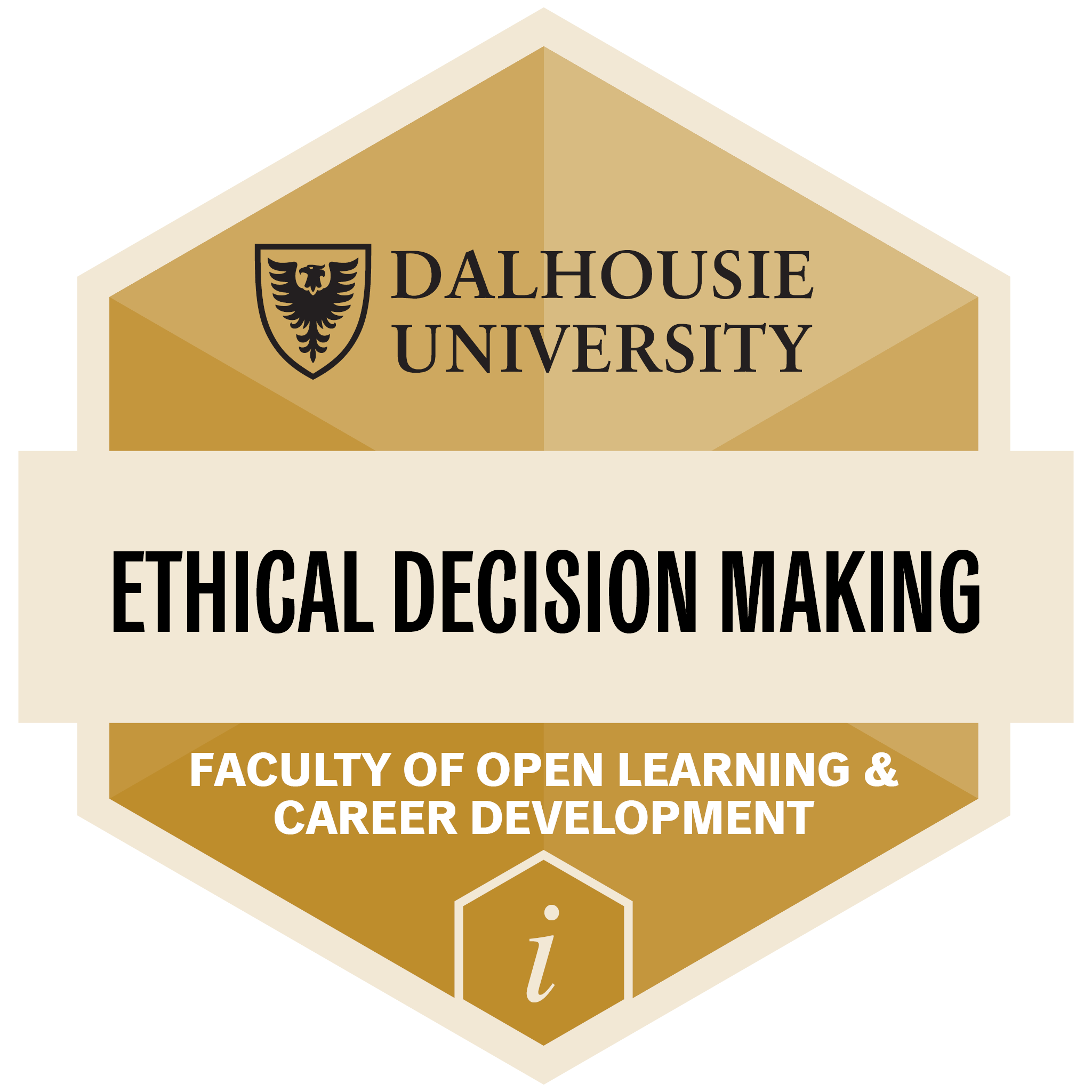Course Description
This highly interactive course includes journaling, teamwork, and online discussions to enable active learning. It requires deep thinking in order to help you become consciously aware of and articulate clearly about ethics, as well as about your personal ethics and values, ethical dilemmas, and ethical decision-making models. This course focuses on practically relating these learnings to your working life, whether this is in a private business or public service context.
Course Outline
- Introduction to Morals and Ethics
- Exploring Ethical Dilemmas
- Theories of Ethics: Dominant Ethical Theories
- Theories of Ethics: Ethical Decision-Making Models
- Professionalism
- The Relevance of Ethics in your work
- Ethical Decision-Making in a Professional Capacity
- Ethics and Leadership
- Codes, Oaths, Policies, and Governance
- Explore the Approach of Various Professions to Ethics
- The Ethical Organization
- Review
What You Will Learn
Upon completion of this course, learners will be able to:
- Define fundamental moral and ethical theory.
- Apply ethical decision-making to both their personal lives and professional practice.
- Discuss ethical decision-making in applied, real-world context.
- Describe the relationship between ethics and professionalism.
- Identify organizational integrity.
Microcredential
 This course provides learners with the opportunity to earn a microcredential. A microcredential is evidence of a skill or competency that is employment related. Dalhousie microcredentials are developed in collaboration with employers, industries, and/or organizations that relate to the content.Program Design A microcredential can be displayed on social media pages, digital resumes, personal webpages, and in email signatures. To earn the microcredential in this course, learners will need to successfully complete a competency-based assessment.
This course provides learners with the opportunity to earn a microcredential. A microcredential is evidence of a skill or competency that is employment related. Dalhousie microcredentials are developed in collaboration with employers, industries, and/or organizations that relate to the content.Program Design A microcredential can be displayed on social media pages, digital resumes, personal webpages, and in email signatures. To earn the microcredential in this course, learners will need to successfully complete a competency-based assessment.
Learn more about this Leadership microcredential on our website.
Notes
Please contact openlearning@dal.ca for more information.
The Faculty of OLCD recommends an intermediate level of English language proficiency for the most effective learning and participation in our online and face-to-face courses. A list of minimum recommended scores on some common English tests can be found on our website. If you have questions about your English language proficiency and ability to succeed in this course, please contact openlearning@dal.ca.
Prerequisites
There are no prerequisites for this course.Recommended For
This course is recommended for:
- Seasoned, experienced, leaders who wish to revitalize their thinking on ethics and ethics in the workplace
- Aspiring or newly appointed leaders and managers in public or private sector organizations of all sizes
- People with responsibility for managing internal and external conflicts of interest
- Anybody in a position of trust within their organization
- Consultants, advisors, coaches, mentors, HR professionals and others who can benefit from a robust understanding of ethics
Testimonials
"I would absolutely recommend this course to others. I found the blend of self-paced learning with scheduled online sessions to be a great combination. The course is well laid out and easy to follow. Dr. Messenger does a great job leading the online sessions, keeping everyone engaged."
~ Jim Miller
Applies Towards the Following Certificates
- Certificate in Gaming Leadership : Electives
- Certificate in Leadership Excellence : Required
- Non-Credit Diploma in Professional and Leadership Studies : Required - Leadership Excellence
- Certificate in Police Leadership : Required
- Post-Graduate Certificate in Leadership Excellence : Required
- Public Safety Communicator Leadership Certificate : Electives
 Bob Doherty is a respected teacher, consultant, and lawyer with over 25 years experience in the field of information access and privacy (IAP). For more than 10 years he was the first full-time IAP Director for the Province of Nova Scotia, and provided advice and training on the NS FOIPOP Act and Part XX of the NS Municipal Government Act. As a consultant he has provided advice to a myriad number of public sector clients and indigenous communities. He has taught IAP courses at Mount St. Vincent and Dalhousie University, and served as an assistant in IAP courses in the University of Alberta’s IAP Certificate Program. He has also appeared as a speaker or panelist at numerous IAP conferences across Canada and in the United States. He is a member of the International Association of Privacy Professionals (IAPP) and most recently served as a co-chair of the IAPP Halifax Knowledge Net Chapter. He holds a Bachelor of Arts Degree from St. Francis Xavier University, a Master of Science in Communications from Boston University, and a Bachelor of Laws Degree from Dalhousie University.
Bob Doherty is a respected teacher, consultant, and lawyer with over 25 years experience in the field of information access and privacy (IAP). For more than 10 years he was the first full-time IAP Director for the Province of Nova Scotia, and provided advice and training on the NS FOIPOP Act and Part XX of the NS Municipal Government Act. As a consultant he has provided advice to a myriad number of public sector clients and indigenous communities. He has taught IAP courses at Mount St. Vincent and Dalhousie University, and served as an assistant in IAP courses in the University of Alberta’s IAP Certificate Program. He has also appeared as a speaker or panelist at numerous IAP conferences across Canada and in the United States. He is a member of the International Association of Privacy Professionals (IAPP) and most recently served as a co-chair of the IAPP Halifax Knowledge Net Chapter. He holds a Bachelor of Arts Degree from St. Francis Xavier University, a Master of Science in Communications from Boston University, and a Bachelor of Laws Degree from Dalhousie University. Rob Simonds is the Chief Administrative Officer for the Municipality of the County of Colchester, N.S. where he is responsible for the administration and oversight of a $36 Million Operating Budget and $10 Million annual Capital Budget. He is accountable to Council and responsible for providing leadership in the development and administration of all programs, by-laws, polices and other initiatives approved by County Council.
Rob Simonds is the Chief Administrative Officer for the Municipality of the County of Colchester, N.S. where he is responsible for the administration and oversight of a $36 Million Operating Budget and $10 Million annual Capital Budget. He is accountable to Council and responsible for providing leadership in the development and administration of all programs, by-laws, polices and other initiatives approved by County Council.